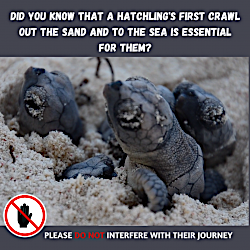The DoE is reminding the public to never interfere with emerging sea turtle hatchlings. They do not need help and attempting to dig them out of the sand can cause more harm than good.
Only DoE teams are authorized to carry out interventions to wild nests. Contact the Turtle Hotline 938-NEST (938-6378) at any time if you suspect a sea turtle, nest or hatchlings are in danger and our experienced team will assist.
Sea turtles are a Part 1 Protected Species under the National Conservation Act (2013) and interfering with a sea turtle, nest or hatchlings in any manner is a criminal offence.
Allowing hatchlings to emerge naturally is extremely important.
 During their final days in the sand sea turtle hatchlings undergo straightening of the carapace (shell), absorb the final remnants of the yolk (their first food/energy source), and take up chemical and magnetic cues that assist in developing their orientation and navigation abilities. The long term impacts of interference to this stage likely have a negative effect on their fitness and survival.
During their final days in the sand sea turtle hatchlings undergo straightening of the carapace (shell), absorb the final remnants of the yolk (their first food/energy source), and take up chemical and magnetic cues that assist in developing their orientation and navigation abilities. The long term impacts of interference to this stage likely have a negative effect on their fitness and survival.
 Hatchlings often spend time very near to the very surface of the sand where they are resting until they feel a temperature cue to leave the nest. They are not stuck and they do not need help, they are waiting for the perfect time to emerge.
Hatchlings often spend time very near to the very surface of the sand where they are resting until they feel a temperature cue to leave the nest. They are not stuck and they do not need help, they are waiting for the perfect time to emerge.
 Digging into a nest alters the sand compaction and can prevent hatchlings that are deeper in the sand from being able to climb and emerge.
Digging into a nest alters the sand compaction and can prevent hatchlings that are deeper in the sand from being able to climb and emerge.
 Hatchling turtles are extremely sensitive to artificial lighting. If you are lucky enough to see an emergence, never use any light and give them plenty of space to make their way to sea.
Hatchling turtles are extremely sensitive to artificial lighting. If you are lucky enough to see an emergence, never use any light and give them plenty of space to make their way to sea.
 The only time intervention is acceptable is if hatchlings are in imminent danger (e.g. heading in the wrong direction towards buildings, pools or roads). In which case, immediately call the Turtle Hotline 938-NEST (938-6378) and our experienced team will assist.
The only time intervention is acceptable is if hatchlings are in imminent danger (e.g. heading in the wrong direction towards buildings, pools or roads). In which case, immediately call the Turtle Hotline 938-NEST (938-6378) and our experienced team will assist.
This photo shows the beginning of a hatchling emergence. Though typically sea turtle hatchlings emerge at night, on occasion, in the rain or on cooler days, they may emerge during the day.











